Gold Humanism celebrates 'other half' of being a doctor
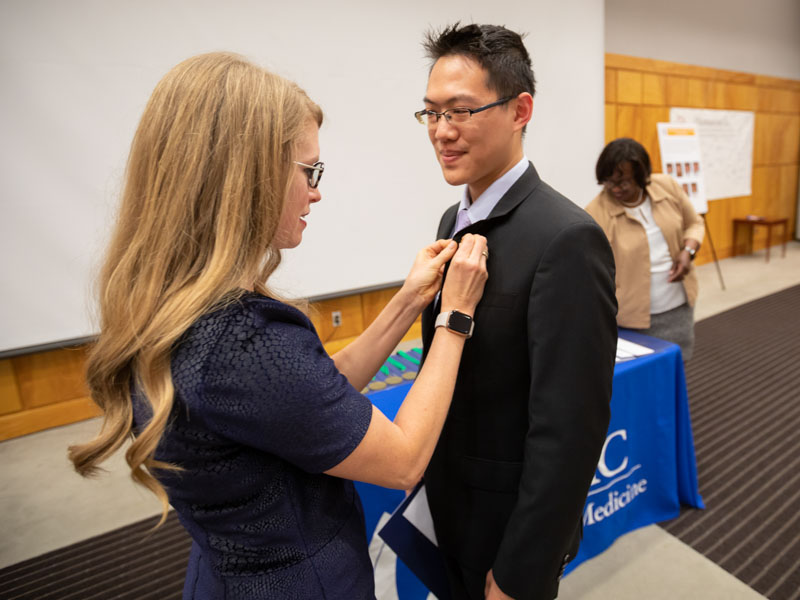
This is how you find out you’re in the Gold Humanism Honor Society: You get bushwhacked with a balloon. Cornered with bag of candy. Hailed with a handshake or even a hug.
That’s how you know you’ve made it – with balloons and bags that come in gold, the color of warmth and compassion, good fortune and wealth, because, in a way, this is like winning it all.
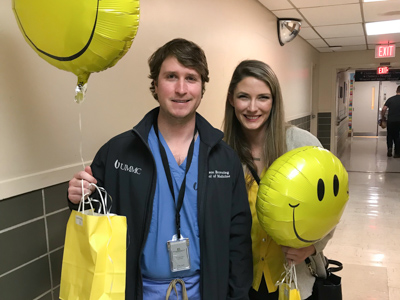
Not that you get a lot of money – or any – but, for people like Dr. Lyssa Weatherly the distinction is, well, the gold standard for physicians and future physicians who value kindness in patient care.
“It’s my favorite award of recognition I’ve ever received,” said Weatherly, assistant professor of medicine in geriatrics, whose faculty profile lists more than 20 accolades since she arrived at the University of Mississippi Medical Center as a student in 2008.
Tuesday night in the Student Union, another 21 rising fourth-year medical students and seven residents officially joined her in the Gold Humanism ranks, during an induction ceremony witnessed by the physician for whom the School of Medicine chapter is named: Dr. Jeanette Pullen.
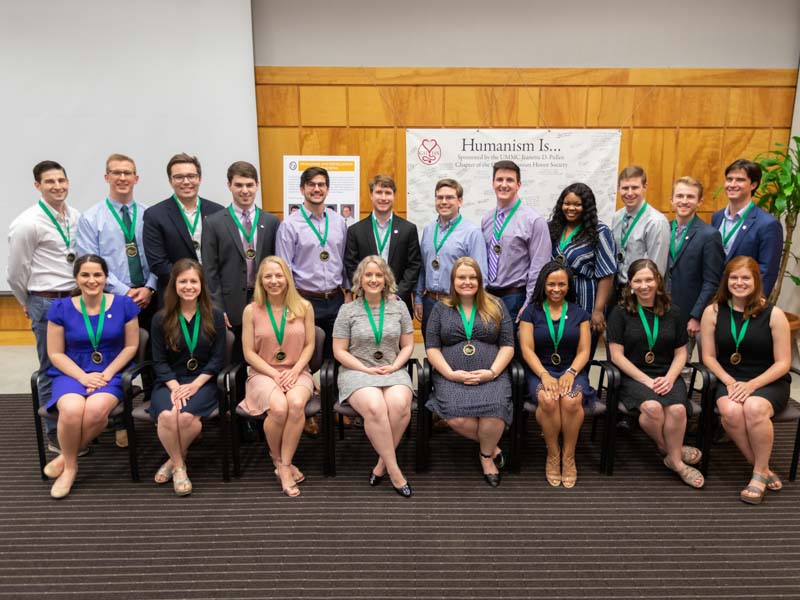
“I believe becoming part of this is maybe the greatest honor you can have,” said Pullen, professor emeritus of pediatrics and former long-time director of the Division of Pediatric Hematology-Oncology.
The society, a program of The Arnold P. Gold Foundation, identifies students, residents and faculty known for treating patients and their families with empathy and respect, who communicate with them well and honestly. It acknowledges them as role models, mentors and leaders.
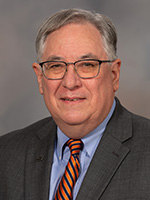
“People are starting to recognize now that the relationship with the patient matters,” said Dr. Ralph Didlake, professor of surgery, associate vice chancellor for academic affairs, and director the Center for Bioethics and Medical Humanities.
“Especially for my generation, these qualities were not emphasized,” said Didlake, who has been practicing medicine for about 40 years. “It was all about technical competency.
“But Gold Humanism is not just a feel-good thing. It has real impact on patients. Year after year, among the top three root causes of sentinel events are those involving communication and human factors.”
Sentinel events are unexpected incidents that cause harm to patients, such as falls or being on the receiving end of the wrong procedure. Which suggests that, to avoid such mistakes, physicians and other caregivers would do well to, among other things, listen to their patients.
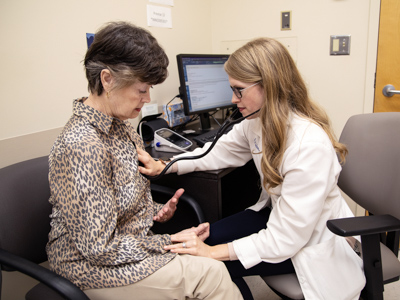
“In reality, I’ve never had a patient ask me what my class ranking was or what I made on an exam,” Weatherly said. “No one ever thanks me for being ‘so smart.’ They will thank you for being sweet or showing that you care.”
Weatherly, as much as anyone at the Medical Center, has the bona fides: She was a Gold Humanism selectee as a medical student in 2010 and later as a resident.
Today, she is the faculty advisor for the Pullen chapter, one of 120-plus chapters in the country with more than 30,000 inductees; she is the successor to Dr. Loretta Jackson-Williams, professor of emergency medicine and vice dean of medical education.
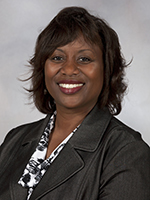
“The people who have been chosen over the years are those who would be doing the same good things they’re doing – even if a chapter didn’t exist here,” Jackson-Williams said.
“These are students who aren’t looking for recognition. They do good just because they’re good people. To create a program that’s centered around that is a wonderful thing.”
That program has been in this School of Medicine since 2005, when Dr. LouAnn Woodward heeded the advice of Dr. Helen Turner, now associate vice chancellor emeritus and former professor of infectious diseases.
“She encouraged me to investigate and determine if we should have a chapter,” said Woodward, vice chancellor for health affairs and dean of the School of Medicine, who was in the medical school’s Office of Academic Affairs at the time.
The New Jersey-based Arnold P. Gold Foundation, started by the late Dr. Arnold Gold and his wife, Dr. Sandra Gold, and others, created the award in 2001 to “perpetuate the tradition of the caring doctor.”
At UMMC, the chapter is host to several activities, such as the White Coat Ceremony in August, a rite for entering medical students; and the Student Clinician Ceremony, set for June 20, to welcome rising third-year students to the world of clinical rotations.
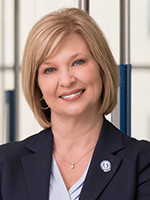
“I really loved the idea of an honor society that recognized humanism, compassion, professionalism, and communication skills,” Woodward said.
The way inductees are chosen was also a plus, she said. Students, along with faculty and staff, weigh in – and heavily so – filling out a survey that asks them, among other things, to name the classmate they would want to be their own doctor. Which has a culling effect.
“I am really, really proud of this,” Woodward said. “We were in the first third of medical schools establishing a GHHS chapter. When our students are competing on a national playing field this is an important feather in their cap.”
That “feather” is now displayed on medical students’ applications for residency training. As they compete for a spot, they will be judged not only by their brains, but also by their heart.
“That is a big deal,” Weatherly said. “This is only the fourth year that has been done. A medical student has a lot of stress because of the emphasis on academic achievement. But to be acknowledged just for that neglects one half of being a physician.
“Gold Humanism recognizes that other half; it’s that well-roundedness that is not always appreciated.”
This institution made a serious move to remedy that as of Sept. 13, 2005, the date of the UMMC’s first Gold Humanism ceremony. Dr. Sandra Gold, whom Woodward picked up at the airport and drove to Brent’s Drugs on an errand, was the guest speaker.
“Unfortunately, when some doctors gave up carrying their black bags, the deep and trusting relationships between the doctor and his or her patient became gravely endangered,” Gold said in her address.
“The realities of health care, death and dying, require the skills of care so perfected by the doctors of old who had less to offer scientifically.”
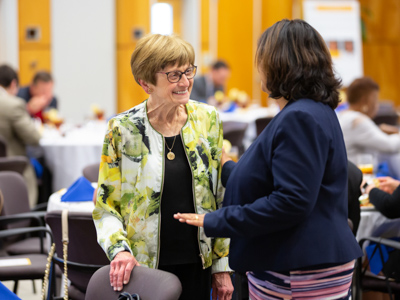
Pullen was also present that day, still mulling over the fact that, less than two weeks earlier, she had learned whose name was stamped on the chapter.
She was informed in a letter signed by Dr. Dan Jones, then the associate vice chancellor for health affairs, and now the Mr. and Mrs. Joe F. Sanderson Jr. Endowed Chair in Obesity, Metabolic Diseases and Nutrition. In it, he cited Pullen’s “exemplary service to others, integrity, clinical excellence and compassionate and respectful relationships with patients, families, and colleagues … .”
Her colleague, Dr. Owen “Bev” Evans, now professor emeritus of pediatrics, had nominated her.
“I was shocked. And very grateful,” Pullen said after Tuesday’s event, featuring keynote speaker Dr. John Caleb Grenn, a resident in internal medicine and pediatrics.
Fourteen years earlier, at the inaugural ceremony, it was Pullen who delivered words of advice to the first inductees; she paraphrased that speech Tuesday during an interview: “Having the clinical skills to be able to take care of your patients should come first.
“But to be effective, you have to work with patients and their families, just as you would want another physician to work with your own family.
“When you get to know them a long time,” she added, “you not only get to be their doctor; you also get to be their friend.”
Dr. Michael Yeung-Lai-Wai of Jackson, had his photo made with Pullen shortly after he was received into the society Tuesday as a rising third-year resident in family medicine.
“This is a really big honor for me,” he said. “I guess it’s verification that I’m doing something right and that the students appreciate what I do.”
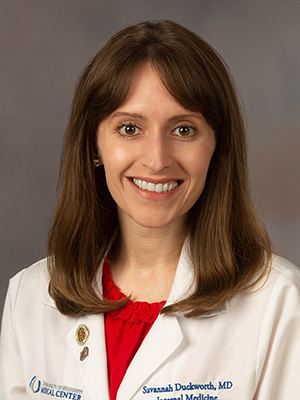
The students are asked to appreciate a resident from each of the various core specialties. At the Medical Center, Dr. Savannah Duckworth was appreciated every year of her training in internal medicine.
Now a UMMC assistant professor of medicine, the New Albany native is this year’s faculty winner of the Leonard Tow Humanism in Medicine Award, also launched by the Gold Foundation, for clinical excellence coupled with generous patient care.
“For those who love their patients, who fight for them, being selected into this society is one of the highest awards you can get,” said Duckworth, who attended the observance as a guest.
“I love this ceremony, the people who are here and what we’re celebrating.”
During the celebration, the students receive a certificate and a lapel pin, as well as a medallion they’re asked to wear on another red-letter day in their lives – graduation.
But the rejoicing actually begins, more or less, in March, with a tradition that started here: Tap Day – the day of balloons and candy. Much of the credit for pulling this off goes to Ludivina “Lucy” Varela-Quintero, project manager in the Office of Medical Education.
“She could not be a better representative of what Gold Humanism stands for,” Weatherly said.
The balloons Varela-Quintero marshals for their secret mission all wear smiley faces – mirroring the expressions of those who receive one.
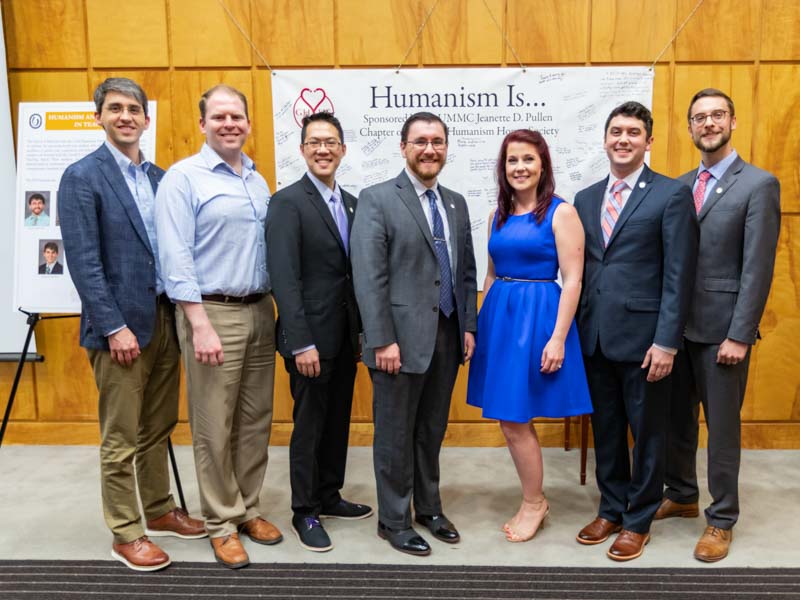
GOLD HUMANISM HONOR SOCIETY CHAPTER ACTIVITIES
- White Coat Ceremony: Entering medical students receive their first white coats and a Gold Humanism pin.
- Student Clinician Ceremony: Each rising third-year medical student receives a white coat emblazoned with his or her name.
- Wellness Day: First-year medical students, as well as M2’s in a separate event, unite for a half-day retreat with physicians and residents.
- Solidarity Week: Gold Humanism chapters across the country promote recognition of patients and patient care to further bonding between patients and students. GHHS members show residents how much they’re appreciated with doughnuts and thank-you notes.
- M4’s in the honor society meet with M3’s to coach them on the stressors they’re about to face, such as away rotations and applying for a residency.
- For every member of the entering medical school class, honor society members handwrite welcome letters listing helpful resources, important contact numbers, etc.
- HOPE Banquet: Honoring Our Patient Educators is a new event set to debut in April of 2020. Each M3 is asked to choose a patient who has taught him or her the value of humanistic medicine. These patients, who are invited to join the students at a banquet, are eligible for the HOPE Award.


